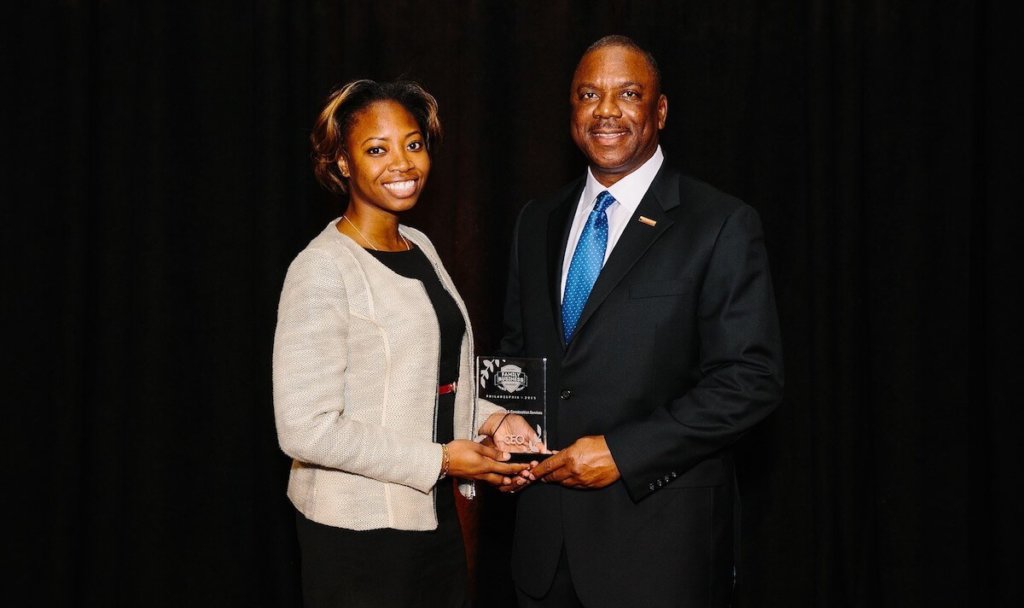Interview with Angelo Perryman, CEO, Perryman Construction, USA
When Jimmie Lee Perryman came home from the Korean War to his hometown Evergreen, Alabama, in the early 1950s, he did not return to his previous employment at a bridge building company as everyone expected him to. Perryman had other plans. The war had changed his view of the world, and he went out on his own to build a construction firm that soon became highly sought-after. Over 60 years later, Perryman Construction is a renowned commercial general construction and construction management firm based out of Philadelphia, Pennsylvania.
Under the second-generation leadership of Angelo Perryman, the family business grew from a trade construction firm to a thriving mid-sized business. He oversaw the expansion of industrial, pharmaceutical, historic restoration and commercial sectors to its portfolio. The company now has more than 1,000 projects on its records and continues to have a positive impact on the surrounding community. With Angelo’s daughter Angelina Perryman and son, Anthony Perryman joining the firm, the family business has officially entered its third generation.
Tharawat Magazine had the opportunity to speak with Angelo Perryman about his family business’ early beginnings, its transition from Alabama to Pennsylvania, and importance of culture in any successful business.
Your family business started with a fascinating founder’s story. Could you tell us a bit about its history and how it all came about?
When my father was growing up in the 1940’s and 50’s, it was a time when your parents were your career mentors and trainers. In other words, your first jobs were working for whoever your parents worked for. My grandfather was employed at a company called Black’s Bridge Building Company, so naturally, my dad ended up working with him, building steel bridges all over the southeast. But my father started to realise that the job wasn’t interesting enough for him – he wanted to do more.
So he decided to enlist in the Korean War. During the war, my dad learned masonry, plumbing, and carpentry, skills he acquired as a result of prepping bases for the troops. One of the more important things that I remember from his stories from that period was about his change in mindset after dealing with different ethnic groups as a part of his war experience. He explained how the war either heightened or eliminated the issues of race as he got a chance to see people from different parts of the world work towards a common goal.
When he came out of the military, he, of course, had to come home and integrate back into society. He said to himself, “I’ll go back and get my old job with Black’s Bridge Building Company. And life moves on.” But when he returned, what he saw gave him a different perspective. Even though he had changed, Evergreen Alabama had not. He had become a much more open person, but his community remained closed-minded. It was very apparent to him that his newly formed worldviews were not welcome in a place where he had lived and worked for his entire life prior to his time in the military.
He realised he had to go out and make it on his own. So in 1954, he decided to start a company, and he called it Perryman Building and Construction.
That must have been quite a challenge for him in the beginning.
Absolutely. But he was also a fairly amicable person, and there was always a need for somebody with his set of skills. Interestingly enough, one of my dad’s biggest projects in the early years came from his home church. There was a historically white church called Belleville Baptist Church, and when it decided to build a new church, they gave the old church to the local black community.
At that time, such a construction project was considered a big job, but nevertheless, he took it on the church renovation and new addition. In time, he became known as a church builder. One job after another, he just kept building churches after churches. And that’s what laid the foundation for the firm, and that’s how it was able to move forward.
As a young child, what do you remember from watching your father work? And how did you decide to join him eventually?
We were a typical family business. I’m the youngest of three brothers, and as children, we all had a role. They would help out with the heavier things, and I would handle supplies by bringing in materials. Indirectly, I was learning about logistics, planning and material management as I kept track of the supplies that were needed each day.
Then when I was 8 years old, my job was mixing mortar for the masons to build brick homes. I remember my dad would tell all of his friends that as he was laying down a layer of bricks going in one direction, he would look up and see that I was already coming down from the other side with my layer.
When I got closer to college age, my dad and I started to have a difference of opinion on where the company should be headed. I was of the opinion that we could take a different approach in terms of the kind of projects that we take on. So I decided to gain some experience by going after the commercial projects that we hadn’t done before. My first project outside of the family business was at a pulp and paper mill in Prattville, Alabama. It was my first real chance to see what goes on in a 1,000-acre facility, and it gave me a whole different perspective. Logistics became much more complex. Managing such a large number of people and how you organise crews of people – it required another level of expertise. It was an invaluable learning experience that I was able to bring back when I eventually returned to work in the family business.
What brought about the decision to make Philadelphia the new home for the family business?
At that time, Philadelphia was going through a major transformation. A significant portion of the economy was built on manufacturing, and when the manufacturing industry started to decline, the city took the huge step of saying, “We’re going to innovate into hospitality.” The first crown jewel of the city’s hospitality was the construction of the Pennsylvania Convention Center. I got an offer to be the superintendent of a 100-year-old building called the Reading Terminal Train Shed, which was intended to be one of the cornerstones of the Pennsylvania Convention Center.
Completing projects in Idaho, Alaska and Michigan provided career development, but for me, the convention centre project also represented an opportunity that would allow my family to put down roots in one place and just let the children be children. One of the most important lessons I brought from my upbringing in Evergreen back in Alabama was that children need time to enjoy and experience all the steps in their life. So I chose not to let this opportunity pass me by and moved to Philadelphia. The Pennsylvania Convention Center was a project big enough to sustain our family, and I saw that it could also be the place to reconnect with our family business Perryman Construction and start fresh in a new location.
Where does the business stand today in terms of size and scope?
Our business has evolved throughout the years. At one time, we used to manage between 35 and 100 in-house employees, but since then, our business has evolved to construction management, which allows us to work in multiple states assuring quality, logistics and schedule for our customers. We currently employ about 17 people now, who are part of our directly managed staff. During an actual project, we indirectly hire over 200 additional people to carry out speciality trades.
What are some of the values and identity that you accentuate inside the family business?
Our company motto is, “Quality people performing quality jobs, always count.” That was something that my dad always used to say. We still hang on to that culture because it is a powerful statement about our philosophy, which is that we’re just looking for good people that can do a good job. Those are the kind of people that we want to encourage –the people who make outstanding members of the community, and the people that can help your business continue as you want it to be.
There are some things money can’t buy. Integrity and character are two things that can’t be bought, and neither is our reputation; these things mean a great deal to us. And the customers pick up on that.
One of the things that I’ve learned from my earlier days as a project trouble-shooter is that you’ve got to learn how to listen. We pride ourselves on really listening and taking what we hear to put ourselves in the position of the clients. In the end, it comes down to understanding that you are trying to help somebody that came to you in search of what you said you could do.
[ms-protect-content id=”4069,4129″]
Your son and daughter are the third-generation members of Perryman Construction. Do you feel like there is an advantage in enforcing culture when there are multiple family members in the business?
Everybody has the option to choose their actions. You can either make a good choice, or you can make a bad choice. And no matter whether you are in a family business or not, everybody should be making the choice to work hard.
But I think that one of the advantages that a family business has is that it offers customers a visual understanding of your commitment. When you are a member of a family business, it is easier for customers to see you working hard and toiling with your commitment because your name is on the company. When customers interact with a member of a family business, they are getting a chance to see the core of the person and understand how that person came to be is who he or she is. And now it’s associated with a name – it ultimately culminates with your name.
When you think of the different tribes that you feel you belong to – your family, your business, and your community – how do these different tribes shape the identity that you have as a person? And how do you feel that transfers to your business?
The thing that comes to mind is that when my dad was running the business, he could point to three other firms that exist only because of the help they received from him – he gave training to people who had no previous construction experience. It’s all about treating people the way you want to be treated.
Our culture has always been that we believe in giving people a chance. I’ve seen young people that were headed down the wrong path completely straighten out their focus and become good members of their family and community after getting an opportunity to work at our company. I’ve seen people in my generation find the desire to stick to their training rather than give up because they’ve seen our firm’s dedication to show them what they can do with their potential. I’ve seen people who would have never left their hometown travelling state to state as they work with us, helping them change their worldview. This is something we’ve always had as a culture, and it’s what we’ve always believed in.
[/ms-protect-content]

